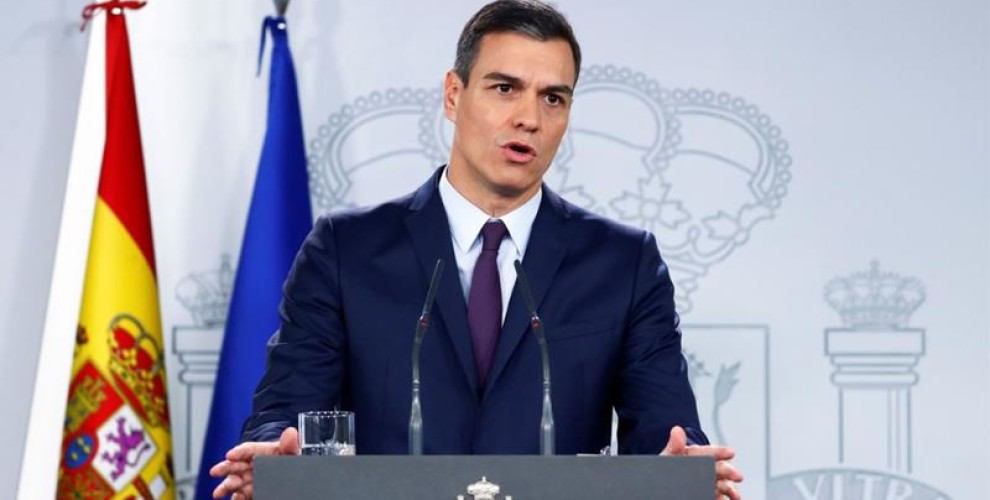Spain goes to the polls
The fragile government finally could not withstand so much pressure and called for snap general elections.
The fragile government finally could not withstand so much pressure and called for snap general elections.

The Spanish government has announced snap political elections for April 28.
The decision is a direct consequence of the failure of the dialogue with the Catalan Autonomous Government and the subsequent rejection of the budget in the Parliament, with the votes against, among others, of the pro-independence Catalan parties (PdCat and Esquerra Republicana de Catalunya, ERC).
The government led by the leader of the Spanish Socialist Workers Party, PSOE, Pedro Sanchez, lasted just 8 months. It was formed as a result of the triumph of a motion of censure, because of corruption, against the then Head of Government, Mariano Rajoy, of the conservative Popular Party (PP).
The autonomic elections in the region of Andalusia were the first warning, with the victory of right and far right parties arguing among themselves as to who was more intransigent and patriotic. The central theme of the campaign, in an area with serious labor and social problems, was the situation in the remote Catalonia.
The call to defend the "unity" of Spain was enough and the results allowed the right to take power and fend off the PSOE, which had governed there since the beginning of the Autonomy in 1982.
Other issues of strong controversy during the past eight months have been: the law of "Historical Memory" and the intention of the Government to transfer the remains of dictator Francisco Franco outside the Valley of the Fallen, a monumental funerary site, an apology to the Franco regime, located near the capital.
Also in bitter and strong tones have been the debates and questioning surrounding the gender law, the right to abortion or the need to near ETA-related prisoners to jails in the Basque Country.
Nevertheless, it has finally been the Catalan question that has triggered the crisis. The failed attempt of the central government's political dialogue with the Catalan autonomous government (an independentist coalition of PdCat and ERC) led to the Catalan pro-independence supporters' rejection of the budget, and it coincided with the beginning, 4 days earlier, of the controversial trial of the former independence leaders by the Supreme Court for having unilaterally declared the Catalan Republic.
A political declaration that the accusations qualify as rebellion, or sedition, in spite of the absence of violence during all the process leading to the declaration. The prosecutor is seeking jail sentences from 11 to 75 years.
The leaks that the frustrated negotiation pre-agenda included the figure of a "rapporteur", and a negotiation on the possibilities of exercising the right of self-determination, within the current legal framework, provoked a virulent reaction from the right, which accused the Head of Government, of "treason to the motherland" and of wanting to ”break up Spain".
The fragile government finally could not withstand so much pressure and called for snap general elections.
The date of the new elections, chosen after particular partisan calculations, avoids the possibility of an electoral super-Sunday, so the political elections, which will define Government, will happen almost a month before those convened for the European Parliament, as well as several important regional and municipal regions.
The last three available polls on the intention of vote show more uncertainty than certainty because their figures refer to a national analysis rather than territorial particularities or the complicated Spanish electoral system, a mixture of proportional and D'Hont Law, to benefit a no longer existing two-party system.
These polls give a slight victory to the PSOE, followed closely by the PP, the right-wing Citizens and the centre-left coalition Podemos-Izquierda Unida, at the same time that they announce the irruption of the extreme right-wing Vox in the Parliament.
However, beyond the total number of votes obtained by the large "national" formations, attention must be paid to the territorial concentration of votes, and to the presence of the parties of the "historical nationalities" and of other regional ones, given that in Spain there is no single constituency (except for the European Parliament) and the deputies are distributed in 54 provinces and two special territories (the African enclaves of Ceuta and Melilla).
An example of the above would be the fact that in the last legislative elections Izquierda Unida (where running alone) got almost one million votes, dispersed in all the provinces, gaining only two deputies, while the Basque independent left, EH- Bildu, with 290,000 votes concentrated in the four Basque provinces, drew the same number of representatives.
So more than the number of votes will be the distribution of the deputies which will provide the answer as to who can govern Spain in the next four years, or if it will be necessary to call new elections, to obtain a majority or a stable and solid government agreement.